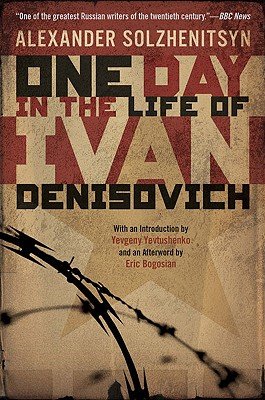
Alexander Solzhenitsyn’s classic novel One Day in the Life of Ivan Denisovich was published 50 years ago this month.
A short, simply-told tale about a prisoner trying to survive the Gulag – the Soviet labor camp system – it is now regarded as one of the most significant books of the 20th Century.
“It was still dark, although a greenish light was brightening in the east. A thin, treacherous breeze was creeping in from the same direction. There is no worse moment than when you turn out for work parade in the morning. In the dark, in the freezing cold, with a hungry belly, and the whole day ahead of you. You lose the power of speech…”
In November 1962, one story shook the Soviet Union.
Alexander Solzhenitsyn described a day in the life of a prison camp inmate, Ivan Denisovich Shukhov.
The character was fictional. But there were millions like him – innocent citizens who, like Alexander Solzhenitsyn himself, had been sent to the Gulag in Joseph Stalin’s wave of terror.
Censorship and fear had prevented the truth about the camps from being published, but this story made it into print. The USSR would never be the same again.
“We were absolutely isolated from information, and he started to open our eyes,” remembers writer and journalist Vitaly Korotich.
Life in the camps was something “it was impossible even to think about” he says.
“I read it and re-read it and I simply thought about how brave he was. We had a lot of writers but we never had such a brave writer.”
It was Soviet leader Nikita Khrushchev who had sanctioned publication of Alexander Solzhenitsyn’s novel nearly a decade after Stalin’s death. Allowing a book on the Gulag, he thought, would help debunk Stalin’s personality cult. However, one story sparked many more.
“After it was published, it was impossible to stop it,” Vitaly Korotich recalls.
“Immediately we received a lot of illegal publications. A lot of people who were in prison started to remember how it was.
“It was not the time of computers and printers. Books were printed on cigarette paper, it was the only way to make more copies. The Soviet Union was destroyed by information, only information. And this wave started from Solzhenitsyn’s One Day,” he said.

“According to his dossier, Shukhov was in for treason. He’d admitted it under investigation – yes, he had surrendered in order to betray his country and returned from a POW camp to carry out a mission for German intelligence. What the mission could be, neither Shukhov himself nor his interrogator could imagine. They left it at that – just <<a mission>>. The counter-espionage boys had beaten the hell out of him. The choice was simple enough: don’t sign and wear a wooden overcoat, or sign and live a bit longer…”
Hardline communists tried to put the genie back into the bottle. Nikita Khrushchev was deposed, de-Stalinization halted, and in 1974 Alexander Solzhenitsyn was arrested and expelled.
But that didn’t save the Soviet Union. And once the USSR had fallen apart, the full scale of Stalin’s crimes became clear.
On the edge of Moscow, Anatoly Mordashev shows me 13 mass graves stretching 1km (0.6 miles) around a field.
What happened here on the Butovo firing range was kept secret for more than half a century.
Between August 1937 and October 1938, 20,760 prisoners were brought to this place and executed by Stalin’s secret police. People living nearby were told the gunshots were just shooting practice.
Murdered here were Soviet workers and peasants, scientists and sportsmen, engineers and office clerks. They had been declared enemies of the people. And this was just one of many Stalin-era killing fields across the USSR.
Anatoly Mordashev tells me that now Russia knows the truth, it must never lose sight of what happened.
And yet Russia has already started to forget.
According to a recent survey, 48% of Russians today believe that Stalin had a positive influence on their country. Only 22% consider it was negative.
Alexander Solzhenitsyn’s widow, Natalya Dmitrievna, blames the leaders of modern Russia, including Mikhail Gorbachev and Boris Yeltsin, for failing to make the country face up to its past.
“They didn’t carry out any de-Stalinization,” she said.
“On a state level, no-one ever declared communism to be criminal, or Stalin a tyrant who waged war on his own people. Now it’s too late for words.”
“All Eastern Europe after the end of the Soviet Union tried to finish with the communist way of life, in Poland, in Germany, everywhere,” recalls Vitaly Korotich.
“But not here. We needed our Nuremberg, like in Germany. But we never had it. And until we start discussing the problem of communism on the level Solzhenitsyn started 50 years ago, we’ll still live in this half-Soviet country which wants to be part of mankind, but is afraid of information about its own history.”